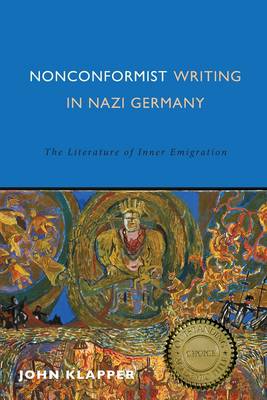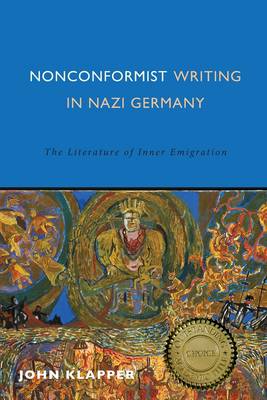
- Afhalen na 1 uur in een winkel met voorraad
- Gratis thuislevering in België vanaf € 30
- Ruim aanbod met 7 miljoen producten
- Afhalen na 1 uur in een winkel met voorraad
- Gratis thuislevering in België vanaf € 30
- Ruim aanbod met 7 miljoen producten
Zoeken
€ 257,95
+ 515 punten
Uitvoering
Omschrijving
An innovative, critical, historically informed, yet accessible reassessment of writers who remained in Nazi Germany and Austria yet expressed nonconformity - even dissent - through their fiction.
2016 CHOICE Outstanding Academic Title Studies of literary responses to National Socialism between 1933 and 1945 have largely focused on exiled writers; opposition within Germany and Austria is less well understood. Yetin both countries there were writers who continued to publish imaginative literature that did not conform to Nazi precepts: the authors of the so-called Inner Emigration. They withdrew from the regime and sought to express theirnonconformity through camouflaged texts designed to offer sensitized readers encouragement, reassurance, and consolation.
This book provides a critical, historically informed reassessment of these writers. It is innovative inscope, in its use of little-known sources, in placing authors and texts in a detailed social and political context, and in analyzing seminal topoi and tropes of oppositional discourse. One of the most extensive studies of the topic in German or English, it provides a state-of-the-art text for literary historians, scholars, and students of German literature, but also, thanks to its accessibility and translation of all material, serves as an introduction for English-speaking readers to this poorly understood group of writers. Two contextualizing chapters are followed by chapters devoted to Werner Bergengruen, Stefan Andres, Friedrich Reck-Malleczewen, Gertrud von le Fort, Reinhold Schneider, Ernst Jünger, Ernst Wiechert, and Erika Mitterer. John Klapper is Professor in the Department of Modern Languages at the University of Birmingham, UK.
2016 CHOICE Outstanding Academic Title Studies of literary responses to National Socialism between 1933 and 1945 have largely focused on exiled writers; opposition within Germany and Austria is less well understood. Yetin both countries there were writers who continued to publish imaginative literature that did not conform to Nazi precepts: the authors of the so-called Inner Emigration. They withdrew from the regime and sought to express theirnonconformity through camouflaged texts designed to offer sensitized readers encouragement, reassurance, and consolation.
This book provides a critical, historically informed reassessment of these writers. It is innovative inscope, in its use of little-known sources, in placing authors and texts in a detailed social and political context, and in analyzing seminal topoi and tropes of oppositional discourse. One of the most extensive studies of the topic in German or English, it provides a state-of-the-art text for literary historians, scholars, and students of German literature, but also, thanks to its accessibility and translation of all material, serves as an introduction for English-speaking readers to this poorly understood group of writers. Two contextualizing chapters are followed by chapters devoted to Werner Bergengruen, Stefan Andres, Friedrich Reck-Malleczewen, Gertrud von le Fort, Reinhold Schneider, Ernst Jünger, Ernst Wiechert, and Erika Mitterer. John Klapper is Professor in the Department of Modern Languages at the University of Birmingham, UK.
Specificaties
Betrokkenen
- Auteur(s):
- Uitgeverij:
Inhoud
- Aantal bladzijden:
- 464
- Taal:
- Engels
- Reeks:
- Reeksnummer:
- nr. 165
Eigenschappen
- Productcode (EAN):
- 9781571139092
- Verschijningsdatum:
- 1/09/2015
- Uitvoering:
- Hardcover
- Formaat:
- Genaaid
- Afmetingen:
- 152 mm x 229 mm
- Gewicht:
- 848 g

Alleen bij Standaard Boekhandel
+ 515 punten op je klantenkaart van Standaard Boekhandel
Beoordelingen
We publiceren alleen reviews die voldoen aan de voorwaarden voor reviews. Bekijk onze voorwaarden voor reviews.








